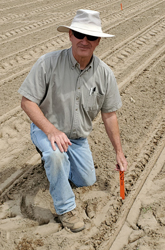 Steve M. Brown is a 1978 graduate in agronomy and soils from Auburn University and later earned MS and PhD degrees in agronomy/weed science at Auburn and Texas A&M, respectively. He worked as an assistant county agent in a cotton pest management role for a couple of years in northern Alabama and then served as a research associate in a Cotton Incorporated-funded project on no-till cotton from 1980 to 1984. From 1987 until 2008, he served as an Extension weed scientist and cotton agronomist for the University of Georgia in Tifton. He worked for a major seed and biotechnology company from 2008 until 2019, when he joined the faculty at Auburn. His entire career has focused on cotton.
Steve M. Brown is a 1978 graduate in agronomy and soils from Auburn University and later earned MS and PhD degrees in agronomy/weed science at Auburn and Texas A&M, respectively. He worked as an assistant county agent in a cotton pest management role for a couple of years in northern Alabama and then served as a research associate in a Cotton Incorporated-funded project on no-till cotton from 1980 to 1984. From 1987 until 2008, he served as an Extension weed scientist and cotton agronomist for the University of Georgia in Tifton. He worked for a major seed and biotechnology company from 2008 until 2019, when he joined the faculty at Auburn. His entire career has focused on cotton.
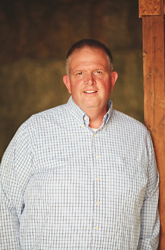 Randy Norton is an associate regional Extension specialist with the University of Arizona and also serves as the resident director of the Safford Agricultural Center. He has a BS degree in plant sciences with an emphasis in crop science and MS and PhD degrees in soil and water science with an emphasis in soil fertility and soil chemistry. The primary focus of his work is improving the efficiency and sustainability of desert agricultural systems through a broad research and Extension program directed at solving production challenges faced by growers across Arizona. Areas of research and Extension focus include soil fertility, variety evaluation, and management of certain pests and diseases in Arizona crop production systems.
Randy Norton is an associate regional Extension specialist with the University of Arizona and also serves as the resident director of the Safford Agricultural Center. He has a BS degree in plant sciences with an emphasis in crop science and MS and PhD degrees in soil and water science with an emphasis in soil fertility and soil chemistry. The primary focus of his work is improving the efficiency and sustainability of desert agricultural systems through a broad research and Extension program directed at solving production challenges faced by growers across Arizona. Areas of research and Extension focus include soil fertility, variety evaluation, and management of certain pests and diseases in Arizona crop production systems.
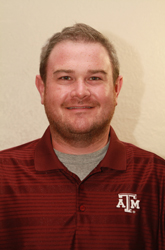 Ben McKnight is the Extension cotton specialist with the Texas A&M AgriLife Extension Service. He completed his undergraduate and MS studies in agronomy at Texas A&M University and earned a PhD in agronomy from Louisiana State University. His MS and PhD research focused on novel weed management strategies in production agriculture.
Ben McKnight is the Extension cotton specialist with the Texas A&M AgriLife Extension Service. He completed his undergraduate and MS studies in agronomy at Texas A&M University and earned a PhD in agronomy from Louisiana State University. His MS and PhD research focused on novel weed management strategies in production agriculture.
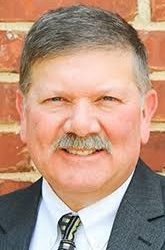 Ken Lege is an Extension cotton specialist at Lubbock’s Texas A&M AgriLife Extension & Research Center. He has worked in the cotton industry for the last 37 years and considers himself cotton’s biggest advocate. While his career began as a cotton specialist at Clemson University, he’s spent much of his profession developing cotton varieties with companies such as, Monsanto, Delta and Pine Land Company, Sure-grow Seed and most recently, Corteva Agriscience.
Ken Lege is an Extension cotton specialist at Lubbock’s Texas A&M AgriLife Extension & Research Center. He has worked in the cotton industry for the last 37 years and considers himself cotton’s biggest advocate. While his career began as a cotton specialist at Clemson University, he’s spent much of his profession developing cotton varieties with companies such as, Monsanto, Delta and Pine Land Company, Sure-grow Seed and most recently, Corteva Agriscience.
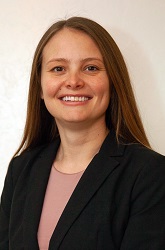 Jenny Dudak is an Oklahoma State University Extension cotton specialist. She grew up in a small town in northeast Iowa and spent much of her childhood on her grandparents’ farm in Illinois, where she developed a passion for agriculture. Although she did not grow up in a strong cotton farming area, Dudak said the crop quickly felt like home. Her cotton career started as a student worker for the cotton Extension program at Texas A&M University, transitioning into a graduate student position studying cotton agronomics at TAMU and eventually providing private consulting while obtaining her Ph.D. in cotton weed science at Oklahoma State University.
Jenny Dudak is an Oklahoma State University Extension cotton specialist. She grew up in a small town in northeast Iowa and spent much of her childhood on her grandparents’ farm in Illinois, where she developed a passion for agriculture. Although she did not grow up in a strong cotton farming area, Dudak said the crop quickly felt like home. Her cotton career started as a student worker for the cotton Extension program at Texas A&M University, transitioning into a graduate student position studying cotton agronomics at TAMU and eventually providing private consulting while obtaining her Ph.D. in cotton weed science at Oklahoma State University.
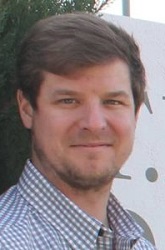 Bradley Wilson is an Assistant Research Proffesor & Cotton Extension Specialists for the University of Missouri. He has a Ph.D in Plant and Soil Sciences from Oklahoma State University. The goal of his program is to provide timely research-based information for cotton producers that can be used as decision-making tools in their operation to increase productivity and profitability. Research focuses on agronomic practices in cotton production, including on-farm cultivar evaluations, nutrient management practices, pest management practices, and cultural management strategies such as planting date, seeding rate, cover crop utilization and crop rotation. Research trials will also be conducted in collaboration with regional and national cotton scientists, as well as MU researchers.
Bradley Wilson is an Assistant Research Proffesor & Cotton Extension Specialists for the University of Missouri. He has a Ph.D in Plant and Soil Sciences from Oklahoma State University. The goal of his program is to provide timely research-based information for cotton producers that can be used as decision-making tools in their operation to increase productivity and profitability. Research focuses on agronomic practices in cotton production, including on-farm cultivar evaluations, nutrient management practices, pest management practices, and cultural management strategies such as planting date, seeding rate, cover crop utilization and crop rotation. Research trials will also be conducted in collaboration with regional and national cotton scientists, as well as MU researchers.
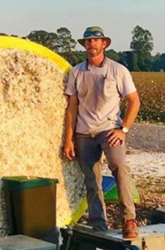 Tyler Sandlin is a regional Extension crops specialist for Auburn University. He primarily covers northern Alabama and conducts research in all agronomic row crops, with emphases on cotton and wheat. His current research and Extension work focus on cotton and wheat variety selection and herbicide strategies for various row crops. Tyler received BS and MS degrees in agronomy from Mississippi State University.
Tyler Sandlin is a regional Extension crops specialist for Auburn University. He primarily covers northern Alabama and conducts research in all agronomic row crops, with emphases on cotton and wheat. His current research and Extension work focus on cotton and wheat variety selection and herbicide strategies for various row crops. Tyler received BS and MS degrees in agronomy from Mississippi State University.
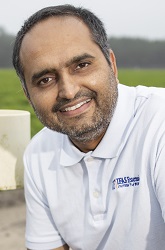 Sudeep Singh Sidhu is an Assistant Professor of Agronomy at the University of Florida. He heads research and extension efforts to develop site-specific nutrient and water management strategies for various cropping systems in FL (peanut-cotton- cotton; peanut-corn-carrot; peanut-corn) with and without cover crops. Dr. Sidhu establishes on-farm demonstration trials for testing new and upcoming technologies for making them cost effective and practical to be used on a farm scale. He organizes in-service trainings for county and regional extension faculty along with field days and workshops to spread knowledge to stakeholders.
Sudeep Singh Sidhu is an Assistant Professor of Agronomy at the University of Florida. He heads research and extension efforts to develop site-specific nutrient and water management strategies for various cropping systems in FL (peanut-cotton- cotton; peanut-corn-carrot; peanut-corn) with and without cover crops. Dr. Sidhu establishes on-farm demonstration trials for testing new and upcoming technologies for making them cost effective and practical to be used on a farm scale. He organizes in-service trainings for county and regional extension faculty along with field days and workshops to spread knowledge to stakeholders.
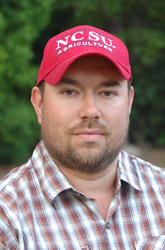 Guy D. Collins began his career in 2009 as the Extension cotton agronomist at the University of Georgia after completing his PhD in crop science at North Carolina (NC) State University the same year. He earned his MS in crop science and his BS in agronomy from NC State in 2006 and 2004, respectively. Dr. Collins returned to NC State University in 2015 and served as the cotton Extension associate professor until 2020, when he was promoted to cotton Extension professor. Although his official appointment is 100% Extension, he is heavily engaged in applied agronomic research conducted on his own and collaboratively with other cotton faculty in multiple departments. In his Extension work, Dr. Collins provides assistance, support, and training programs for county agents and growers regarding cotton production and management. His research supports his Extension program by providing current information that enables cotton growers to maximize yield potential, reduce production costs, optimize timing of agronomic inputs, and employ decision aides. His current research and Extension efforts focus on large-scale, on-farm evaluations of cultivar stability across environments, plant growth regulator management, seed quality and replanting decisions, and management strategies to maximize yield and fiber quality. Dr. Collins works closely with county agents, the NC State University cotton team, the NC Cotton Producers Association, Cotton Incorporated, the Extension Cotton Specialists Working Group across the United States, and seed and crop protection companies.
Guy D. Collins began his career in 2009 as the Extension cotton agronomist at the University of Georgia after completing his PhD in crop science at North Carolina (NC) State University the same year. He earned his MS in crop science and his BS in agronomy from NC State in 2006 and 2004, respectively. Dr. Collins returned to NC State University in 2015 and served as the cotton Extension associate professor until 2020, when he was promoted to cotton Extension professor. Although his official appointment is 100% Extension, he is heavily engaged in applied agronomic research conducted on his own and collaboratively with other cotton faculty in multiple departments. In his Extension work, Dr. Collins provides assistance, support, and training programs for county agents and growers regarding cotton production and management. His research supports his Extension program by providing current information that enables cotton growers to maximize yield potential, reduce production costs, optimize timing of agronomic inputs, and employ decision aides. His current research and Extension efforts focus on large-scale, on-farm evaluations of cultivar stability across environments, plant growth regulator management, seed quality and replanting decisions, and management strategies to maximize yield and fiber quality. Dr. Collins works closely with county agents, the NC State University cotton team, the NC Cotton Producers Association, Cotton Incorporated, the Extension Cotton Specialists Working Group across the United States, and seed and crop protection companies.
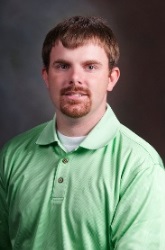 Hunter Frame has been the field crops agronomist at Virginia Tech’s Tidewater Agricultural Research and Extension Center since 2012. In this role, he serves as Virginia’s cotton specialist and manages the Official Cotton Variety Testing program; the bulk of his research is focused on soil fertility and plant nutrition issues in cotton production. Projects in Dr. Frame’s research program have focused on nitrogen, sulfur, potassium, and micronutrients. Understanding how cotton yields can be improved through managing nutrients and other agronomic inputs is paramount to enhancing the profitability and sustainability of U.S. cotton producers. This is the overarching goal of Dr. Frame’s research and Extension program.
Hunter Frame has been the field crops agronomist at Virginia Tech’s Tidewater Agricultural Research and Extension Center since 2012. In this role, he serves as Virginia’s cotton specialist and manages the Official Cotton Variety Testing program; the bulk of his research is focused on soil fertility and plant nutrition issues in cotton production. Projects in Dr. Frame’s research program have focused on nitrogen, sulfur, potassium, and micronutrients. Understanding how cotton yields can be improved through managing nutrients and other agronomic inputs is paramount to enhancing the profitability and sustainability of U.S. cotton producers. This is the overarching goal of Dr. Frame’s research and Extension program.
